The third Australian Rallying Hall of Fame dinner was held in Canberra on May 14. John Bryson, Greg Carr, Dave Johnson, Peter Macneall, Ross Runnalls, Ross Tapper, Coral Taylor and Jeff Whitten were the eight worthy recipients of the Hall of Fame award.
Bob Watson put together a brief history of each recipient's history in the sport.
Hall of Fame inductees (L-R): Greg Carr (absent), Coral Taylor, Ross Runnalls, John Bryson, Ross Tapper, Peter Macneall, Jeff Whitten and Dave Johnson.
JOHN BRYSON
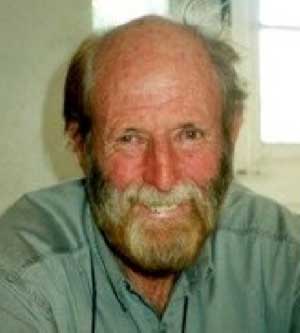 John Bryson has been associated with many great names in rallying, including Andrew Cowan, Roger Clark, Evan Green, Ken Tubman, Barry Ferguson and Doug Stewart, to name a few. He is one of Australia’s most capable, diverse and experienced competitors.
John Bryson has been associated with many great names in rallying, including Andrew Cowan, Roger Clark, Evan Green, Ken Tubman, Barry Ferguson and Doug Stewart, to name a few. He is one of Australia’s most capable, diverse and experienced competitors.
John’s record of three outright wins in the Southern Cross Rally, competitor in the 1968 and 1977 London-Sydney Marathons, the London – Brighton Veteran Car Run, the Mallee Desert Rally, the Papua-New Guinea Safari, the 1979 Repco Round Australia Trial, the Total Economy Run, the BP Rally, the ARC, the New Caledonia Safari, the Peking to Paris, the London-Sahara-Munich World Cup Rally and the Trial to the Nile underline his diversity.
John grew up in Queensland on a sheep and cattle station. He went on to become a Civil Engineer, seeing service in the Australian Regular Army and spending four years in Japan and one in Korea.
He became interested in car rallies and trials and took leave from his civil engineering career to work as a motoring journalist for the Sydney Sun newspaper, and later the Sydney Daily Telegraph and Modern Motor magazine.
Bryson first came to prominence in 1972 when he was invited by the Mitsubishi rally team to navigate for Scotsman Andrew Cowan in the Southern Cross Rally. Cowan and Bryson recorded Mitsubishi’s first win in the Australian classic, leading a top field home in their Colt Galant. They repeated their victory in the 1973 ‘Cross, driving a Lancer with full factory support from Japan, beating strong teams from Nissan and Holden.
Mitsubishi’s participation in rallying can be attributed in part to John Bryson. Doug Stewart’s fourth outright in the 1964 Ampol Trial caused Mitsubishi to enter a Colt 1000 in an Australian endurance event for evaluation. Stewart and Bryson ran in in the 12/12 Mountain Rally, which they won outright, the first win for Mitsubishi outside Japan. The factory was so pleased with the result that Stewart was given two of the next model Colt, the 1100 to test.
One was rallied by Stewart with navigators Barry Lloyd and Bryson at different times, the other by Colin Bond and Brian Hope. Proving successful, factory-prepared Colts were entered for the 1968 Southern Cross Rally, Mitsubishi’s first step into international rallying. When Andrew Cowan and Bryson won the ‘Cross in 1972 in a Galant, Mitsubishi’s rallying career really began in earnest and from then on the company became a dominant force in rallying worldwide.
Much of John Bryson’s reputation can be attributed to his navigational skills, map reading ability and “office management”, but he was no slouch as a driver, winning 188 trophies for driving. Bryson often contested 50 events or more each year, such was his fascination with rallying and motorsport.
A little unconventional, perhaps a tad eccentric, Bryson grabbed media attention during the 1979 Repco Round Australia Trial when he married long-time navigator, Sonja Kable-Cumming at Broken Hill during the event.
Evan Green was a good friend of John’s. They teamed up to compete in the Australian Rally Championship, the Rally of New Zealand, the New Caledonia Safari and the 1977 London to Sydney Marathon in which they finished 10th outright and won their class in a Range Rover. However their biggest effort was taking a Leyland P76 V8 on the London – Sahara - Munich World Cup Rally in 1973, the dramatic story of which has been told in Evan’s book “A Boot Full of Right Arms.”
Former Mitsubishi rally team member and author Barry Lloyd tells about John Bryson’s enthusiasm in his book, “You can’t get there from here”. “We were driving without a windscreen when a farmer’s truck pulled out of a paddock in front of us”. The road was narrow and the farmer would not move over so John Instructed Barry to pull up as close as he could to the back of the truck. John climbed through the windscreen then leaped onto the truck and poked his head through the driver’s window. “Excuse me,” he said, “but would you mind pulling over?” The startled driver did, as Bryson jumped back into the car and they took off.
Apart from his competition successes, John’s personal high points include being President of the North Shore Sporting Car Club, an honorary member of the Thornleigh Car Club in Sydney, and President of the NSW-based Society of Advanced Motorists for a 10 year period. He and Sonja were the inaugural road directors for the “Camp Quality Capers” which raised considerable sums of money for children with cancer.
John’s enthusiasm has been inherited by his sons, Matthew and John. Matt and veteran driver Gerry Crown have won two Peking to Paris events in cars prepared by Matt. John navigated for Matt in the 7000 km 2008 Red Centre to Gold Coast Trial. After suffering a few mechanical problems and having to open hundreds of gates, exertions that would have taxed a much younger man, John looked twenty years younger at the finish of the event. He still ain’t finished yet.
With such an exciting, successful and diverse career, John Bryson is a worthy inductee to the Australian Rally Hall of Fame.
GREG CARR
 Triple Australian Rally champion Greg Carr has the distinction of winning his three titles in three different makes of car. He first took the title in 1978 driving a Mark 2 Ford Escort BDA (the famous IYK000) for Colin Bond’s Ford rally team. Nine years later in 1987 Greg won the title again, this time driving an Alfa Romeo GTV6, and stayed with the Italians to win again in 1989 in a Lancia Delta Integrale.
Triple Australian Rally champion Greg Carr has the distinction of winning his three titles in three different makes of car. He first took the title in 1978 driving a Mark 2 Ford Escort BDA (the famous IYK000) for Colin Bond’s Ford rally team. Nine years later in 1987 Greg won the title again, this time driving an Alfa Romeo GTV6, and stayed with the Italians to win again in 1989 in a Lancia Delta Integrale.
Hailing from Canberra, Greg started rallying in a Ford Cortina GT and rose through the Australian rallying ranks in numerous Datsun 1600 starting in the 1973 rallying season. In 1974 Carr and navigator Wayne Gregson won the Bunbury Curran Rally, an Australian championship heat.
Greg Carr began his domination of the Don Capasco Rally (later the Castrol International Rally) run in the forests around the national capital, in 1975. He won the prestigious event a further six times in succession against strong international opposition that included Stig Blomqvist and Ari Vatanen.
In 1976 Carr won four rallies in a Datsun 180B SSS for the Gerry Ball rally team and n 1977 his obvious talent was recognised when Colin Bond signed him to drive a works Ford Escort BDA. Carr had his first Australian Rally Championship round win with Ford in the 1977 Bega Valley Rally. In the Southern Cross Rally that year Carr led until late on the last night before retiring with alternator failure.
In 1978 Greg won the Australian Rally Championship for the Ford works team. During this era Carr and Bond in their Escorts fought with Ross Dunkerton and George Fury in their works Datsuns in what is widely regarded as a classic period of Australian rallying.
In 1978 Greg competed in the International Burmah rally in Scotland in an Escort, surprising the rally world by finishing a very creditable 6th and winning the Man of the Rally award. The following year he finished 10th outright in the RAC Rally, leading home many top professional drivers. A works drive with Ford was mooted, however the factory wanted a driver with pace note and tarmac experience, both missing from Australian rallying at that time.
The Ford Australia works rally team was wound up at the end of the 1980 season. Greg moved on to rally a factory FIAT 131 Abarth in the ARC f4rom 1982 to 1984, scoring four wins. It was not until 1987 that Greg Carr won his second national rally championship in a Colin Bond built Alfa Romeo, navigated again by the late Fred Gocentas . Two years later Carr added a third Australian Rally Championship title to his name driving an ex works Lancia Delta Integrale with Mick Harker.
Greg’s record in the ARC is remarkable. As well as winning three titles he was runner up three times and was never lower that 5th in the championship standings during his ten year career. Although never winning the coveted Southern Cross rally, Carr came close in 1975 finishing 3rd, and in 1980 was second to Ross Dunkerton and ahead of team mate Ari Vatanen.
Greg was also remarkably successful in another classic Australian driver’s event, the Alpine Rally. He won the event six times, and surprisingly considers his Alpine wins superior to his Castrol Rally successes. “I consider my Alpine wins to be a more significant achievement. Basically, the Alpine was a tougher event. It was physically tougher on man and machine and the combination of difficult terrain and high temperatures made for a tough rally”. The only other driver to have won as many Alpines was the late Frank Kilfoyle.
After his retirement from Australian rallying in 1989, Greg continued with a program in Asia, mainly with the Proton team. From 1996 he became involved in Australian rallying on the official side driving as car zero in Australia’s world championship heat, Rally Australia from 2000 to 2009. He later took on the role of driver safety standards checker for tarmac rallies for CAMS, ensuring that the course and the instructions supplied to competitors for events such as Targa Tasmania were of a sufficient standard to ensure crew safety.
There is no doubt that Greg Carr is one of the all time great drivers of Australian rallying and he is an outstanding addition to the Australian Rally Hall of Fame.
DAVE JOHNSON
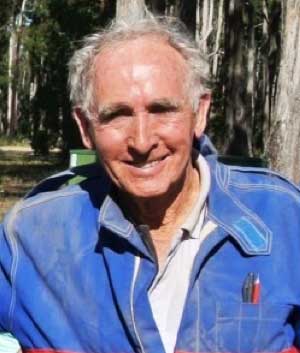 David Johnson (“Dave”) started in club car trials in 1955, navigating for the likes of Ron Green, Jack Murray and Ken Tubman, the latter two Redex Trial winners. Dave tells many Jack Murray tales, including when they were competing in a NSW BP Rally. During a 4am fuel and meal break, “Gelignite Jack” lit a double bunger cracker and dropped it behind a radio reporter who was taping an interview. It was replayed on air by the local radio station, reporter’s reaction and explosion included.
David Johnson (“Dave”) started in club car trials in 1955, navigating for the likes of Ron Green, Jack Murray and Ken Tubman, the latter two Redex Trial winners. Dave tells many Jack Murray tales, including when they were competing in a NSW BP Rally. During a 4am fuel and meal break, “Gelignite Jack” lit a double bunger cracker and dropped it behind a radio reporter who was taping an interview. It was replayed on air by the local radio station, reporter’s reaction and explosion included.
Dave Johnson has a great interest and passion for maps and map reading. He was a surveyor by profession for over 30 years. Rallying in the early days was all about map reading, finding the best and shortest possible route and keeping the driver and car heading in the right direction, working together as a team.
Dave’s leadership qualities led him to start up the Mosman Sporting Car Club in the early 1960s, which soon merged with the Vaucluse Car Club, two of many clubs that had started up in the fever that followed the Round Australia trials. These clubs became feeder clubs to the Australian Sporting Car Club which at the time was the State’s premier Trials Club.
In 1958 Dave became Chairman of the initial State Rally Panel and he served on the CAMS NSW Board of Management until 1972. He was instrumental in getting the New South Wales State Rally Championship started in 1960. By 1962 the trials/rally movement had gathered momentum in New South Wales and Victoria, and new guidelines were laid down for supervision of routes, instructions and timing, and Police and Municipal authorities were involved, in all of which David was a great contributor.
David served on the inaugural National Rally Committee for three years during which the Rally Codes of New South Wales and Victoria were merged to become the first National Rally Code.
In 1964 Dave was NSW State Rally Champion navigator but he was happy to mix competing with official and administration duties. He was official scorer for the Rothmans Southern Mountain Rally (forerunner of the Southern Cross rallies) and streamlined the scoring system so that full results were available 90 minutes after the finish-all in the days before computers.
Dave teamed up with his now life-long friend Barry Ferguson in 1967 to compete in the blue VW Beetle in which they won the Southern Cross Rally that year. They two scored other major placings in 1967, and in early 1968 won the second round of the Australian Rally Championship, the Snowy Mountains Rally in a VW. The pair together with co-driver Doug Chivas were chosen for the Holden/Sydney Daily Telegraph team in the first London to Sydney Marathon Rally in 1968 driving a 350 Monaro. Their car placed 12th outright, best of the team.
In the late 1960s Johnson organised the Sun-Castrol Safety Drive in New South Wales for the Sun Newspaper for four years, with the help of many local car clubs. This format was implemented by Castrol in other States. These events helped bring hundreds of new members into motor sport.
David navigated in the 1969 Southern Cross Rally for Marathon winner Scot Andrew Cowan, driving Tony Fall’s ex Marathon Works Morris 1800. They won.
1970 saw Dave team up with Barry Ferguson again, driving in a works Holden Torana XU1 in which they won both the Southern Cross Rally and the NSW State Rally Championship. This gave Dave his third Southern Cross win.
Dave teamed up again with Andrew Cowan for the Heatway International Rally in New Zealand in a works Mini Cooper S. They won thirteen stages, more than anyone else, but were disqualified due to a parc ferme infringement. With spare time before the event they devised a simple system of noting the corners and road conditions that they recorded and used, possibly a forerunner to today’s pace notes.
David took a break from rallying in the 1970s to start up a business. He returned in 1978 to organise the Volvo Australia Dealer Team in the 1978 Southern Cross and managed the 1979 Repco Round Australia rally team in which he and Volvo Managing Director Harry Jensen competed in a Volvo 242GT. Ross Dunkerton brought a team Volvo home in 4th place behind the triumphant Commodores. Not long after this Dave fully retired from rally and motorsport to concentrate on family and business opportunities.
In 2006 David returned and reunited with Barry Ferguson to contest historic rallies. He has also involved himself with the Classic Rally Club in New South Wales, which has now seen him once again become fully involved with the sport he loves. The club now runs a popular 1960s style event, the Barry Ferguson Classic.
Dave competed with Bob Watson in the 2009 and 2013 Victorian HRA Alpine Rallies. In 2013 Dave was 82, and the crew’s combined age of car, driver and navigator was 200 years. They finished 39th out of 75 entries.
In his competitive career David navigated for no less than six members of the Australian Hall of Fame. He was an innovator and leader in the formative days of Australian rallying, and has contributed to the sport for over sixty years. Welcome David Johnson to your well earned place in the Australian Rally Hall of Fame.
PETER MACNEALL
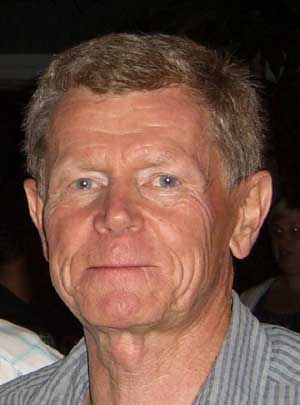 Peter Macneall started his rallying career with the Southern Districts Car Club in Albany in the south of Western Australia as a navigator. He won his first State championship round in 1978 and quickly became recognised as a top talent, winning the WA navigator’s rally championship in 1980.
Peter Macneall started his rallying career with the Southern Districts Car Club in Albany in the south of Western Australia as a navigator. He won his first State championship round in 1978 and quickly became recognised as a top talent, winning the WA navigator’s rally championship in 1980.
After an eventful trip to Malaysia in 1983 with Bob Nicoli in an ex works Nissan Stanza (they hit a rubber tree but the car didn’t bounce back) Peter returned to win the WA round of the ARC in 1984. He again won the State Championship for co-drivers in 1987 and when Rally Australia came along in 1988 he took long service leave from his job at Telstra to assist with the rally organisation. Having directed two State rounds this was his first taste of FIA rally administration.
Rally Australia was given full World Rally Championship status the following year, and Peter was a part of the organising committee until four weeks before the event, when he again became a competitor, finishing 20th outright and winning his class.
Peter has been a member of the organising committee for every Rally Australia, both in the west and on the east coast.
In 1993 Peter became a member of the National Rally Committee, now ARCOM, and through Garry Connelly became involved in several overseas rallies as FIA observer. In 2000 he became the Australian Rally Championship’s Sporting Director, a position he still holds, and in 2004 became Course Checker for the Japanese world championship round that ran for the next seven years.
Peter was the CAMS course checker for the 20,000 km Mobil 1 Round Australia Trial in 1995. Due to adverse weather and other factors the course planning was well behind schedule, so when the time came to do the final course check the route instructions were far from complete. Peter, instead of giving the organisers a well deserved bollocking, jumped in to help, and in fact wrote many of the instructions he was meant to be checking. At least he knew those ones were right! His constructive approach made a great contribution to what was eventually a very successful event.
Firmly locked into rally administration, Peter has been a member of both the FIA World Rally Championship and the FIA Rallies Commission and is currently a member of the Asia Pacific Rally Championship executive. He is now on the world rally stage, and a very deserving member of the Australian Rally Hall of Fame.
ROSS RUNNALLS
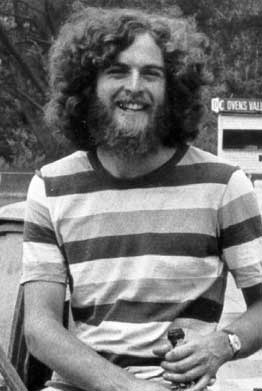 Ross Runnalls gained an early advantage over his rival rally navigators by virtue of studying Forestry at Creswick in central Victoria. His early understanding of the logic of forest roads and access to maps not available to the general public soon put him on the path to success.
Ross Runnalls gained an early advantage over his rival rally navigators by virtue of studying Forestry at Creswick in central Victoria. His early understanding of the logic of forest roads and access to maps not available to the general public soon put him on the path to success.
As his career progressed through the Forestry Department (which as an aside, seemed to have a new name every couple of months, usually containing the words conservation, resources, environment, sustainability and anything else the public service could dream up) Ross moved around Victoria working in various forestry areas, increasing his knowledge of forests as he went.
Ross was the undisputed top navigator (as opposed to co-driver) in Victoria - and probably Australia- during his career. Between July 1981 and June 1983 he won a remarkable 23 events, with two DNF's, and was Victorian Champion navigator in 1981.
He teamed up with another young forestry officer Geoff Portman and the pair had outstanding success, winning the Australian Championship in 1981 and 1982. Ross was an inaugural inductee into the Victorian Rally Hall of Fame in 2005.
Ross was chosen by the canny George Shepheard to partner Ed Ordynski in the 1995 Mobil 1 Round Australia Trial in a works Commodore. Pitted against the flamboyance of both Peter Brock and Ross Dunkerton in the same team, Ross’s job was to shield his driver from the glare of publicity and keep him focused on the job in hand, which worked beautifully for Ross and Ed. They won the event.
Ross was also the winning co driver in the 1989 Australian Safari with David Officer. If you wanted the best co-driver for a major event Ross Runnalls was the man. He has competed in Australia, New Zealand and East Africa, and co-driven for Japanese Monster Tajima in seven World Rally Championship rounds.
Putting back into the sport, Ross has directed many events, including the highly navigational BP Rally re-runs in Victoria, of which he ran three. He delights in making navigators explore the mysteries of his mind. He also directed Victorian Championship rounds in the 1980s, the Snowy River Trial in 1994 and was Clerk of Course for the Australian Safari in 2012 and 2013.
Ross Runnalls is a current member of the Australian Rally Commission. He has achieved an enormous amount in his favoured sport, and has put plenty back. He is a prestigious inductee into the Australian Rally Hall of Fame.
ROSS TAPPER
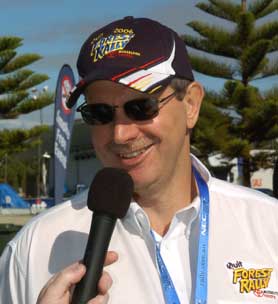 Ross Tapper must be one of the hardest working officials ever in the sport of rallying. The fact that he lives in WA and has done most of his good work there means he is less well known to most east coast rallyists.
Ross Tapper must be one of the hardest working officials ever in the sport of rallying. The fact that he lives in WA and has done most of his good work there means he is less well known to most east coast rallyists.
Ross Joined the WA Car Club in 1975 and once he was shown how to do a hand brake turn, became hooked on throwing cars around. He joined the Car Club Sports Committee soon after, organising club runs.
In 1976 Ross started rallying. His then navigator who was organiser of the Pathfinder Rally, the hardest navigation event in WA, needed assistance so Ross offered to help which meant days out driving around in the bush looking for navigation traps, which he really enjoyed.
The following year no one offered to run the event, so out of frustration Ross said he would do it but admitted he had no idea what to do. As is often the case, once he said yes, people then came forward to help. The upshot was that the Premier of WA started the rally in the centre of Perth and it was a huge success. Ross was then hooked onto rally organising as well as competing.
In 1978 Ross launched into a full time career of organisation. He ran state events every year for a number of years and continues to help to this day. 1980 and 81 he helped run the WA round of the ARC, Rally of the West and at the end of 1981 Ross attended his first ARC Organising meeting at the Alpine Rally in Bright.
The Forest Rally first ran as a WA state event in 1983 and Tapper was part of the team that set it up. He then took on the development of the event, running it for the first time as an ARC round in 1985. In 1987 Ross decided to retire from competing and from 1988 through to 2015 became Clerk of Course of the Forest Rally which has been an ARC round for 30 years.
The organisers of Rally Australia also took advantage of Ross’s expertise, making him Assistant Clerk of Course for Safety from 1988-1994. This involved setting up Doctors, ambulances, fire trucks, spectator points, SOS tracking, the event Safety Plan and eventually Communications.
In the early 1990’s Ross helped Glen Cuthbert set up the ARC Organisers group which along with ARCom transformed the ARC from 6 isolated events into a co-ordinated Championship. After Glen Cuthbert died Ross helped Neil Cuthbert and Justin Hunt run the Rally of Melbourne.
From 2005 to2015 Tapper broadened his scope, joining with Bob Schrader to run Targa West, a National Tarmac Rally in WA. Tarrmac rallying has progressed from the early days of cars travelling to Tasmania for a single event to there being well over 100 tarmac cars in WA. This has led to the organisation of “feeder” events to allow crews to get more experience at Targa South West and short Rallysprints, and made it possible for Ross to work full time on rallying.
Spreading his activities interstate, Ross worked with Les Walkden, Geoff Becker and Scott Spedding from 2002 to 2006 to run Rally of Tasmania. More recently he became Chairman of the WA Rally Panel from 2009-2015, and in 2014 was Clerk of Course of the Australasian Safari with Justin Hunt.
Over the course of his career, Ross Tapper has been Clerk of Course for no less than 28 major rallies. His unflagging enthusiasm and vast experience have made him in to one of Australia’s top rally organisers, and he truly deserves the honour of induction into the Australian Rally Hall of Fame.
CORAL TAYLOR
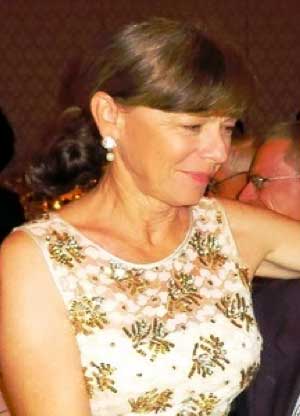 There is a certain drive and energy about Coral Taylor that stands out, which is not surprising. Her father Norm Fritter was a rally driver, and about as committed to rally driving and living life to the full as a person could possibly be.
There is a certain drive and energy about Coral Taylor that stands out, which is not surprising. Her father Norm Fritter was a rally driver, and about as committed to rally driving and living life to the full as a person could possibly be.
Coral and her sister Pearl, who is married to Victorian rally stalwart Steve Hollowood, grew up in Queensland, and Coral navigated for her father in local events as a buildup to the Repco Round Australia Trial in 1979. She and Norm intended to compete in the Repco as a “one off” adventure, but the bait was taken and Coral was hooked.
The pair continued to contest Queensland Rally championship events and the occasional ARC rally such as the Alpine. Coral then moved on to co-drive for Peter Markovich in Queensland and ARC events in an Escort.
Not content with just competing, Coral directed club rallies in the early 1980s and even drove in some club rallies. She says she couldn’t find a decent co-driver, as husband Mark kept getting her lost, so her career settled on co-driving. She co-drove for Peter Glennie from 1983 to 1986, winning her first ARC event in Tasmania with Peter in 1986 in a Datsun 1200 coupe.
Family matters then took over with the birth of Jane in 1986 and Molly in 1988. Both daughters did some rallying inside their mum’s tummy before they were born! Part of rallying then consisted of feeding babies and toddlers in the service park.
After co-driving for Jon Waterhouse and Jim Middleton on a one off basis Coral joined forces with Murray Coote in the Mazda Rally team during 1991 and 1992. Then came the big rally move of her life, to the Neal Bates Toyota Team Australia team. Coral took over the management of the team, including co-ordination with major sponsors as well as the co-driver’s role.
Coral has been associated with Neal Bates and Toyota for over 20 years, although the official Toyota ARC effort was stopped in 2008 due to the Global Financial Crisis. Those years included winning the Australian Rally Championship with Neal in 1993, 1994, 1995 and 2008. The team was responsible for developing various model Celicas and Corollas over the years for Toyota, and also competed successfully in tarmac rallies in a very fast Lexus, winning Targa Tasmania in 1995. The team was the first in the world to post a win in the new Corolla WRC car.
As a matter of interest, a recent investigation showed that the two oldest motorsport teams in Australia are Neal Bates Motorsport and Brad Jones Racing.
The Bates team’s focus switched to classic rallying in 2012, and Coral and Neal have won the ARC Classic Challenge in 2012, 2013 and 2014 and the New Zealand Otago Classic Rally in 2013 and 2014 in a very rapid Celica. The Bates/Taylor team has been virtually unbeatable in this class of rallying.
Just to fill in her spare time, Coral sits on the Board of the NRMA motorist’s organisation and the National Heavy Vehicle Regulator board as well as mentoring daughter Molly in her promising rally career, and occasionally driving the Bates Toyota Team service truck to ARC events.
This remarkable woman, Coral Taylor, has the total respect of all who have dealt with her. She is a charming person, but utterly professional in her rallying. She has well and truly earned her place in the Australian Rally Hall of Fame.
JEFF WHITTEN
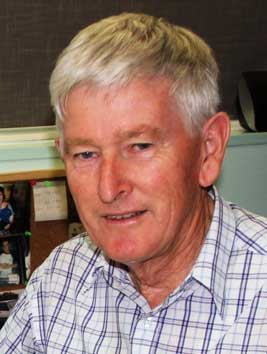 Jeff Whitten has played an active role in Australian rallying for almost 50 years, beginning in 1965. In that time he has competed in over 130 rallies and enjoyed over 20 outright and class wins - and only rolled a car once! He has directed 20 Forest Classic Rallies, both in gravel and tarmac form, and many other rallies and touring assemblies. He has consistently acted as control official, course checker, club steward, motorkhana director, and whatever else was required.
Jeff Whitten has played an active role in Australian rallying for almost 50 years, beginning in 1965. In that time he has competed in over 130 rallies and enjoyed over 20 outright and class wins - and only rolled a car once! He has directed 20 Forest Classic Rallies, both in gravel and tarmac form, and many other rallies and touring assemblies. He has consistently acted as control official, course checker, club steward, motorkhana director, and whatever else was required.
Jeff has held the office of President and Secretary of the North Eastern Car Club many times and is still serving as secretary. He was editor of that club’s magazine and was awarded life membership of the club in 1967.
Among Jeff’s successes are winning the Riverina North East Rally championship twice as a driver, the North Eastern Car Club rally championship as a driver and the Repco Mountain Rally as a navigator.
In 2000 Jeff was awarded the Australian Sports Medal.
However, Jeff’s major contribution to the sport of rallying was as the creator, Manager and editor of Australian Rallysport News and RallySport Magazine from 1989 – 2006. Jeff has been succeeded in the job by his son Peter, but with the Whitten family’s total enthusiasm for the sport enthusiasts were and still are kept informed of the latest happenings in Australian and International rallying.
In step with the times the news is now available through the internet and this is supplemented with insightful stories on people, teams, cars and events that are making news in the sport. It is the only publication in Australia solely dedicated to coverage of rallying.
In 1994 Australian Rallysport News initiated a program named the Australian Rallysport News Junior Rally Challenge, which ran for five years and contributed to young stars Cody Crocker and Greg Foletta obtaining their first factory drive with Subaru.
In Jeff’s view one of the low points in rallying has been the Victorian Government’s decision to privatise most of the softwood plantations that were the home of many classic rallies. The legislation made it illegal to conduct car rallies in these forests, robbing rally enthusiasts of thousands of kilometers of some of the best rally roads in Australia. Fifteen years of negotiation have failed to change the decision.
In addition to the magazine and now web coverage of rallying, Jeff has written and published (with Peter) two editions of the book "How to Start Rallying", and "From Sump Oil to Dust, the first 50 years of the North Eastern Car Club", plus "A Rock and a Hard Place - the real story of the Barjarg motor racing circuit", although the latter has nothing to do with rallying and the track is no longer in use.
Jeff Whitten has devoted a large percentage of his life to the sport of rallying, and given it great service through his rally publications. He is warmly welcomed to the Australian Rally Hall of Fame.
Australian Rallying Hall of Fame
2013 inductees: Neal Bates, Possum Bourne, Garry Connelly, Ross Dunkerton, Harry Firth, John Large, Gelignite Jack Murray, George Shepheard, Tom Snooks, Doug Stewart, Donald Kingsley Thomson, Ken Tubman, Bob Watson.
2014 inductees: Colin Bond, Barry Ferguson, Fred Gocentas, Evan Green, Graham Hoinville, Frank Kilfoyle, David Officer Kate Officer, Ed Ordynski, Jim Reddiex.

